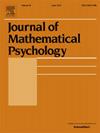跨期决策中的预期指数折现
IF 1.5
4区 心理学
Q2 MATHEMATICS, INTERDISCIPLINARY APPLICATIONS
引用次数: 0
摘要
我们提出了延迟折现的一种新解释——一种理论机制,通过这种机制,如果奖励是在未来而不是立即获得的,决策者就会对当前价值进行折现。该理论提出,决策者理性地考虑复利的自然现象(使用指数贴现),但需要对复利的某些不确定性分布取平均值或期望值。因此,期望指数贴现(EED)的跨期选择理论得名。我们表明,EED提供了一种机制,统一了多个经验发现的描述性折扣函数,并适合于非顺序环境下人类延迟折扣的关键定性发现,例如关于延迟奖励的假设问题。一般的,可证伪的和相对最小的EED理论为更复杂的延迟折扣帐户提供了良好的完整性检查,但也支持新的经验预测和参考点的推导。本文章由计算机程序翻译,如有差异,请以英文原文为准。
Expected exponential discounting in inter-temporal decision making
We present a novel interpretation of delay discounting – a theoretical mechanism by which decision-makers discount the current value of reward if it is obtained at a future time rather than immediately. The theory proposes that decision-makers rationally account for the natural phenomenon of compounded interests (use exponential discounting) but need to take an average or expected value over some uncertainty distribution for the compound interest rate. Hence, the name Expected Exponential Discounting (EED) theory of inter-temporal choice. We show that EED provides a mechanism that unifies multiple empirically discovered descriptive discounting functions and fits to key qualitative findings about delay discounting in humans under non-sequential contexts, such as for hypothetical questions about delayed rewards. The general, falsifiable and comparatively minimal EED theory provides a good sanity check for more complex accounts of delay discounting, but also supports the derivation of new empirical predictions and reference points.
求助全文
通过发布文献求助,成功后即可免费获取论文全文。
去求助
来源期刊

Journal of Mathematical Psychology
医学-数学跨学科应用
CiteScore
3.70
自引率
11.10%
发文量
37
审稿时长
20.2 weeks
期刊介绍:
The Journal of Mathematical Psychology includes articles, monographs and reviews, notes and commentaries, and book reviews in all areas of mathematical psychology. Empirical and theoretical contributions are equally welcome.
Areas of special interest include, but are not limited to, fundamental measurement and psychological process models, such as those based upon neural network or information processing concepts. A partial listing of substantive areas covered include sensation and perception, psychophysics, learning and memory, problem solving, judgment and decision-making, and motivation.
The Journal of Mathematical Psychology is affiliated with the Society for Mathematical Psychology.
Research Areas include:
• Models for sensation and perception, learning, memory and thinking
• Fundamental measurement and scaling
• Decision making
• Neural modeling and networks
• Psychophysics and signal detection
• Neuropsychological theories
• Psycholinguistics
• Motivational dynamics
• Animal behavior
• Psychometric theory
 求助内容:
求助内容: 应助结果提醒方式:
应助结果提醒方式:


